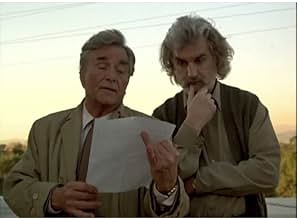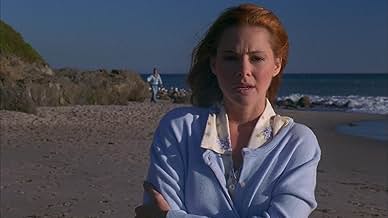A popular film composer murders his talented protege, who's been secretly ghostwriting most of his compositions in recent years, after he threatened to expose their secret to the public. Lt.... Read allA popular film composer murders his talented protege, who's been secretly ghostwriting most of his compositions in recent years, after he threatened to expose their secret to the public. Lt. Columbo investigates.A popular film composer murders his talented protege, who's been secretly ghostwriting most of his compositions in recent years, after he threatened to expose their secret to the public. Lt. Columbo investigates.
Storyline
Did you know
- TriviaBilly Connolly's character name, "Findlay Crawford", is taken from his stand-up comedy, in which he mocks the names wealthy parents give their children. "Findlay" and "Crawford" are two separate names he cites as being particularly irksome.
- GoofsWhen Columbo is on the roof after the body falls, his hair is blowing in the wind and the Sergeant's tie is waving about, but the sheet music remains where it fell.
- Quotes
Lt. Columbo: Oh, sorry to disturb you, sir. I realize this is a bad time.
Findlay Crawford: Have a drink. It's a good time to be drinking.
Lt. Columbo: Uh, not right now, thank you, sir. Still on duty. Would it be all right, sir, if I, uh, smoked a small cigar?
Findlay Crawford: Of course. I love a good cigar myself. There's a humidor over there. Help yourself.
Lt. Columbo: Oh, I'm kind of used to these here, thank you.
Findlay Crawford: Please yourself. Light up, sit down, and make yourself at home. No more home for poor Gabriel, I'm afraid.
Lt. Columbo: Oh, that was unfortunate, sir.
Findlay Crawford: It was a tragedy, Mr. Columbo, a tragedy. A wonderful young man with a great future.
Lt. Columbo: So I heard, sir.
Findlay Crawford: He was like a son to me. Let's have some music.
[classical instrumental music starts playing loudly. Crawford starts acting as a composer and then turns the music off]
Findlay Crawford: Tchaikovsky.
Lt. Columbo: Well, uh, sir, I...
Findlay Crawford: Perhaps you'd rather hear some rock and roll?
Lt. Columbo: I wouldn't say that, sir.
Findlay Crawford: [singing] In a cabin, in a canyon, excavating for a mine, lived a miner
Lt. Columbo: A forty-niner.
Lt. Columbo, Findlay Crawford: And his daughter, Clementine. Oh, my darlin', oh, my darlin', oh my darlin' Clementine, you are lost and gone forever...
Lt. Columbo: Dreadful sorry...
Lt. Columbo, Findlay Crawford: Clementine.
Findlay Crawford: At least we established part of your taste. But I think it's time for some sad music. More befitting the mood of the evening. A little cello, perhaps. Nothing weeps like a cello.
[instrumental cello music starts playing]
Lt. Columbo: Uh, Mr. Crawford... Mr. Crawford, I'm sure you could play wonderful music all night long, but there are a few questions. I realize that this has been a shock to you, but it has to be done.
Findlay Crawford: What did you have in mind, Mr. Columbo?
Lt. Columbo: Where were you, sir, when the deceased fell off the roof?
Findlay Crawford: I was on stage, conducting a concert.
Lt. Columbo: And when was the last time that you saw Mr. McEnry alive, sir?
Findlay Crawford: That would be last evening. In here, in the bungalow.
Lt. Columbo: And sort of mood was he in?
Findlay Crawford: Since I had just informed him he would be conducting the theme from The Killer in tonight's program, ecstatic.
Lt. Columbo: Ecstatic day before... Day before. So, uh... Oh, so he wasn't here when you arrived today?
Findlay Crawford: I arrived at the studio a few minutes before the performance. I didn't see Gabriel. I just assumed, as was his normal practice, he'd be on the roof, conducting along with me, and would appear when he was due on stage.
Lt. Columbo: So the first time that you saw him today he was on the ground. I can imagine how you felt, sir.
Findlay Crawford: I was devastated.
Lt. Columbo: And what did you do right after that?
Findlay Crawford: Some members of the audience had come outside to gawk. I told them to go back indoors. I announced that the performance for this evening was cancelled, and assured those present that the tickets would be good for next Saturday, when an additional piece would be added to the program. A piece that I would compose myself as a trib...
[sniffs]
Findlay Crawford: ... as a tribute to Gabriel.
Lt. Columbo: Oh, very nice gesture, sir. Uh, tell me, did Mr. Gabriel, when he was conducting, did he always use a baton?
Findlay Crawford: Of course. We all use batons. Why do you ask?
Lt. Columbo: Well... Well, you never know, sir. Somebody said he was a bit eccentric.
Findlay Crawford: [scoffs] Not that eccentric.
- ConnectionsFeatured in Columbo: Murder with Too Many Notes
- Soundtracks1812 Overture
Music by Pyotr Ilyich Tchaikovsky
COMMENTARY: There are many things to appreciate about this installment, like the believable and creative set-up: The apprentice practicing on the roof of the theater, the long dormant elevator and the conductor's motive, which isn't just envy, but the threat of ruin and mass embarrassment. Jealousy goes back to Shakespeare and ancient Greek theater, but I find placing envy and status into the framework of Oscar-winning composition compelling. The episode is also an interesting window into the behind-the-scenes activity surrounding the scores to major films.
Yet there are seeming problems with the muddled ending, which can be traced to Patrick McGoohan's rewrites as director. He decided to use a musical demonstration at the climax in order to be theatrical, but the way it's done does not lend itself to a satisfying "gotcha" response. The scriptwriter, Jeffrey Cava, included several clues in his teleplay that failed to make it to the screen after McGoohan's revisions. For instance, the ultimate clue in Cava's script was particularly convicting and impossible for the murderer to dodge, but McGoohan prudently eliminated it for practical reasons. On top of this, it's dishonest to say there is "no evidence" in McGoohan's version. For detailed answers Google The Lt. Columbo Forum and punch-in Murder with Too Many Notes.
Others complain that Columbo's slow drive home with the conductor is filler material. But the rumpled detective already sniffed him out as the murderer and needed to spend time with him to accumulate evidence and start wearing the suspect down in order to eventually break him. Columbo knows that when people get seriously aggravated they start saying & doing things they never intended to and thus reveal evidence against them.
As shot, "Murder with Too Many Notes" is somewhat of a headscratcher, but the answers ARE there if you look for them. Besides, what's wrong with head-scratching in a murder mystery?
GRADE: B/B-
Details
- Release date
- Country of origin
- Language
- Also known as
- Mord efter noter
- Filming locations
- Production companies
- See more company credits at IMDbPro
Contribute to this page































